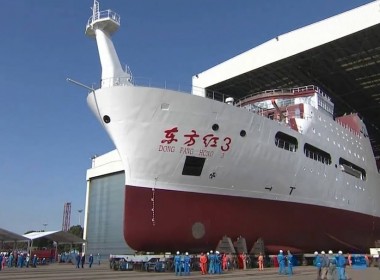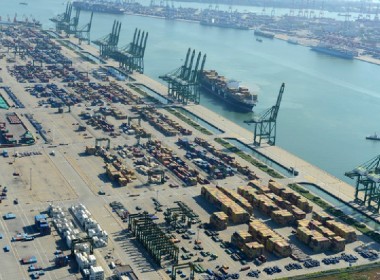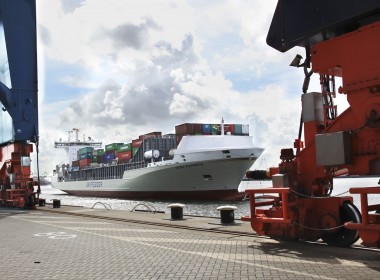COLUMN | Making it easier to be good [Grey Power]
There would have been a few ripples right across the maritime world at the news a few weeks ago that Princess Cruises had been fined a record US$40 million by the US authorities, after pleading guilty to multiple charges of dumping oily waste. Carnival, its parent company, moreover, was to be placed in a sort of special measures, with nearly eighty cruise ships right across their brand subject to additional supervision of environmental matters, for five years.
In a sector where you would think reputation really matters, this was a grim reflection on human nature, with the malpractice involving “magic pipes” and various strategies to minimise the amount of oily wastes shipped ashore into reception facilities. Nothing new about any of this; even after all the years of publicity and criminal prosecutions in the United States, people are still being dragged into the dock over these environmental crimes.
Why on earth do people take such risks in an era when the marine environment is so valued by the public, which will have zero sympathy for anyone who breaks the law in such a fashion? Is it because it is so much easier to dump oily wastes overside, or “park” it in the engine room bilges, than it is to pass it through the oily water separators? Is it because the latter equipment is inadequate for the volumes it is supposed to treat, or it just doesn’t work fast enough for impatient operators?
Excuses, excuses…
Or as we are invited to believe in the case of the Caribbean Princess, a senior officer seemed to infer that the use of shore reception facilities was too costly and over-use of these would be frowned on by technical management ashore? This sort of excuse is hardly original, either, but may contain an element of reality that needs further examination.
We have come a very long way (and hugely changed our attitudes to the marine environment) since the 1973 Marine Pollution Convention, but down through these intervening years a consistent complaint has been the inadequacy of port reception facilities, which enable wastes to be sent ashore in a timely and economic fashion.
There have been ports that simply have prohibited ships from sending waste ashore and others which, either to dissuade the practice, or to make a few bucks, have charged unreasonable sums for the services. Granted, wastes may be noxious or hazardous and may involve quarantine regulations, but IMO itself has published advice about the importance of providing adequate arrangements that do not deter use through excessive costs or burdensome regulations.
Besides, there is no accounting for antisocial people. Where I live, the local council decided to increase the charges on certain large items being recycled at our waste station. Immediately, there was an increase in the rubbish being thrown into our beautiful countryside. Reduce the charges, or make them cost-free for users and the littering would cease. It is sad, but you cannot ignore realities. Why should ships be different?
A few years ago, a friend was commanding a large containership in the Atlantic trades, with a six or seven European port rotation. His tight-fisted operator declined to pay for port services to collect the ship’s garbage, which had to be kept on the afterdeck in evil smelling plastic bags, until the ship reached the one port where the service was free (or rather buried in the port disbursements).
Another master complained about a port where the only reception facility for solid waste and garbage was half a mile down the quay, so, to stay legal, and to discourage the practice of chucking the garbage over the side, some wretched person had to drag stuffed plastic bags of waste this inconvenient distance. Today, almost as much attention is paid to the handling of waste as it is to navigation, with authorities demanding waste is carefully sorted, categorised and accurately declared on forms of bewildering complexity.
Polluter-proof ship designs
Some might suggest that this what society demands, that those who operate ships must comply with regulations, and that it is up to ship owners and designers to make it easy and foolproof so that the laws aren’t broken. And if they put their great minds to it, ships would be designed to make it just about impossible to put oily wastes into the sea, and equipped with effective on-board waste compactors, incinerators and the like, appropriate for the ship’s size and type.
We really have come a long way since the oiled beaches and deliberate operational pollution that brought us MARPOL and all its subsequent annexes, and the days when seafarers never thought twice about dumping things over the side. One might suggest that seafarers are now probably more environmentally conscious than those at the seaside, who are largely responsible for so much of the marine litter that disfigures the shorelines.
I always recall the famous garbage scow which used to come around ships berthed in the Port of Auckland. All our galley wastes, which in those days did not involve plastic wrappings, were tipped into this craft, which, when full, then chugged down the harbour, where, depending on its crew’s need to knock off for the day, it was emptied into the Rangitoto Channel, to be swirled away by the tide amid clouds of delirious seagulls. But there is still room for improvement, as the regular, lamentable court cases demonstrate. Let’s just make it easier to be good.







